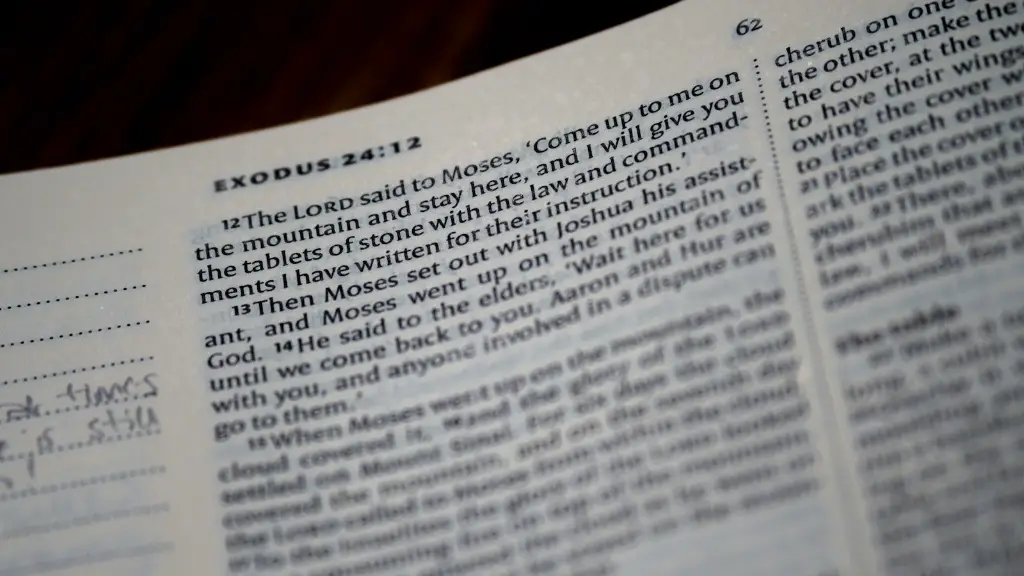Introduction
The ancient Ten Commandments have played an important role in the religious and moral life of human beings and still profoundly influence many cultures today. Commonly understood to refer to codified divine and moral decrees, the bedrock of legal codes and moral systems, the Ten Commandments are featured in both the Old and New Testaments of the Bible. The most well-known version of the Ten Commandments is found in Exodus 20:1-17 and Deuteronomy 5:6-21. This version of the Ten Commandments contain moral, religious and spiritual rules to live by, but their contents, impact and interpretation vary according to faith and culture.
The Original Ten Commandments In The Bible
The Ten Commandments are first mentioned in the Bible in Exodus 20. This passage begins, “And God spoke all these words: I am the Lord your God…” Then, God proceeds to reveal to Moses the Ten Commandments. Biblical scholars generally classify these Commandments into two categories: four commandments related to the worship of God, and six commandments related to relationships with other people.
The first four commandments focus on the way believers should relate to God, while the second six focus on how believers should treat other humans. For example, the first commandment requires believers to put God first, above all other gods. The second commandment instructs believers to not to take God’s name in vain. The third commandment demands that believers observe the Sabbath by setting aside a day to rest from work and to congregate in worship. And the fourth commandment is to honor one’s parents.
The remaining six commandments focus on relationships with other people. The fifth commandment instructs believers to not murder. The sixth commandment instructs believers to not commit adultery. The seventh commandment prohibits theft. The eighth commandment forbids bearing false witness. The ninth commandment prohibits coveting, or desiring something that does not belong to us and the tenth commandment prohibits desiring anything that belongs to another person.
The Variety Of Interpretations
Despite the many references to the Ten Commandments in the Bible, religions often interpret the commandments differently. While some believe the commandments to be legislated laws and focus on following the literal text of the Bible, others view the text symbolically, striving to follow its spirit instead of its letter. interpretations vary according to faith and many modern Christians do not focus solely on the text of the Ten Commandments, but on the overall spirit of the Ten Commandments.
In Catholicism, there is a saying, “Love the Lord your God with all your heart, soul, mind and strength; love your neighbor as yourself.” This is based off the first four commandments and the second six commandments in the Bible, giving advocates of this belief a “rule of life.”
This is just one example of how religions interpret and take action according to the Ten Commandments. An individual’s interpretation of the Ten Commandments, or any divine writing, largely depends on his or her religious or spiritual convictions.
The Impact Of The Ten Commandments On Culture
Though the Bible itself is quite old, the Ten Commandments have a deep spiritual impact on the world today. Many devotees of the Ten Commandments claim that these principles bring stability and moral order. They argue that a just and moral order in the world requires a strong foundation of ten immutable laws of God.
Moreover, the Ten Commandments provide a useful frame for understanding how to think about righteousness, justice and how to act ethically. Many of the laws in the Bible are still used in legislation today. “Thou shalt not steal” is echoed in theft laws while “Thou shalt not murder” is seen in modern homicide laws.
The Parallels Between Other Religious Texts and the Ten Commandments
The Ten Commandments have also been compared and paralleled in other religious texts. For instance, the Amish have a different take on the Ten Commandments. The Amish do not proselytize, as clearly commanded in the Ten Commandments found in Exodus 20.
While the Amish do not promote or enforce the Ten Commandments as part of their religious teachings or practices, many elements in their code of behavior are based on the Golden Rule – “Do to others what you want them to do to you.” This value statement is linked to the Ten Commandment which instructs believers not to do to others what one would not want done unto oneself.
The Cultural Relevance Of The Ten Commandments
Regardless of its interpretation, the Ten Commandments has been regarded historically as a universal law by many Christian cultures and is considered to be the oldest and most important moral anchor of Judeo-Christian tradition. Even today, the Ten Commandments still strongly influence how many individuals interact with their faith, with other people and their day to day lives.
In many countries, the Ten Commandments have been adapted and adapted into various moral codes and laws in order to recognize and keep the respect for the set of core values that those with the Judeo-Christian faith have upheld for centuries. This adaptation is even seen in some areas at the core of many legal systems.
The Challenge To Follow The Ten Commandments In The Modern World
The modern world is a place of rapidly changing values and beliefs. While the context in which the Ten Commandments were initially written may not apply in the same way to today’s society, the principles behind them remain the same. The challenge is to apply relevant interpretations of these principles to the changing world and social climate.
Many individuals are convinced that the Ten Commandments can still be broadly applicable and they advocate that contemporary society should focus on their universal message and moral power. They believe that their core values can be interpreted and applied to create ethical and just societies today.
How The Ten Commandments Impact Social Change
The Ten Commandment’s moral lessons have been used in various ways over the years to shape social change. For example, civil rights activists have looked to the Ten Commandments as a source of inspiration because of its universal law: do not wrong others in your hearts and minds. This call to action to treat others with respect and fairness has often been used to guide and steer changes in society
Some organizations use the Ten Commandment’s doctrine to create awareness and change around global and local issues. They combat oppression and fight against socially unjust situations. Advocates of the Ten Commandments point out that their application to the modern world is not only relevant and necessary, but it can also help bring about complete, whole and lasting global change.
The Role Of The Ten Commandments In Everyday Life
As theTen Commandments offer a framework for ethical and just behavior and respect for all people, no matter their background or faith, they can be a powerful tool to educate and engage the youth of today. Teaching young people about the Ten Commandments and the importance of moral and societal values can help them navigate difficult situations and conflicts in their own lives. Moreover, it can help them become effective leaders in their local and global community.
Within the Judeo-Christian tradition, the Ten Commandments are known as “the way,” and adults play an important role in setting an example and challenging young people to actively live by its values. By providing a solid moral education, adults can help empower young people to challenge and make ethical decisions in their everyday lives.
The Connection Between Religion And The Ten Commandments
Even though the Ten Commandments are deeply rooted in the Judeo-Christian tradition, they are not limited to that faith. The Ten Commandments are often seen as a beacon of moral light anchoring many beliefs and religions. In a sense they become an extension of the faith, an embodiment of its spirit, an intrinsic part of religious life.
In addition, the Ten Commandments can also impact the non-faithful by providing a source of insight about how to lead an ethical life. A person does not have to have a particular faith to recognize the value and power of the Ten Commandments and its principles.
The Evolution Of The Meaning And Impact Of The Ten Commandments
Although the Ten Commandments are often characterized as a set of laws, they are more than just a regulation of conduct. Through the millenniums each faith and culture have found ways to interpret and connect its spiritual message with their daily lives.
The Commandments have moved from the realm of believing to acting and acting to believing. People have used the Ten Commandments to exemplify and explain their religious convictions and moral values to their communities. The Commandments have been transformed from a religious symbol to a universal symbol of morality and justice.
Conclusion
The Ten Commandments have been at the core of religious and moral instruction for centuries and have been adapted and applied in various ways by many cultures and religions. They are still relevant and applicable today, encouraging worldwide civic communities to make a difference and create an ethical, just and sustainable world.
The Ten Commandments were likely considered revolutionary at their time of composition and they remain a powerful source of motivation and moral teaching. As the world changes, so do interpretations and application of the Ten Commandments, but their core principles remain the same. Each faith and culture can draw different lessons, spiritual messages, and inspiration from the Ten Commandments, and be inspired by its power and influence.



